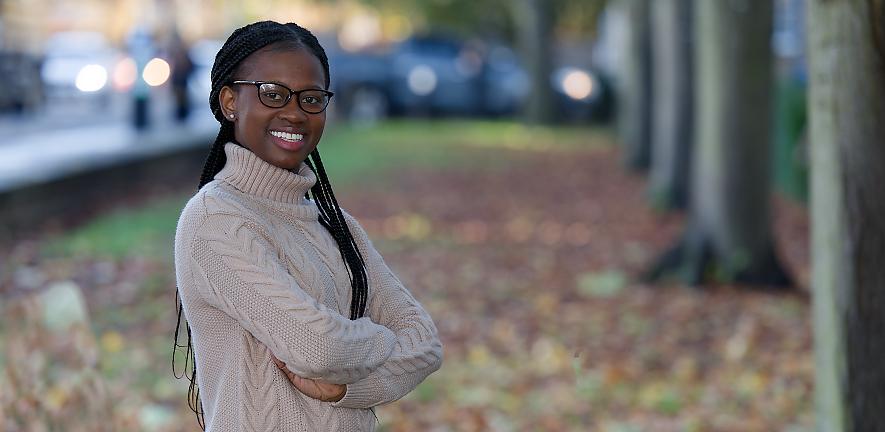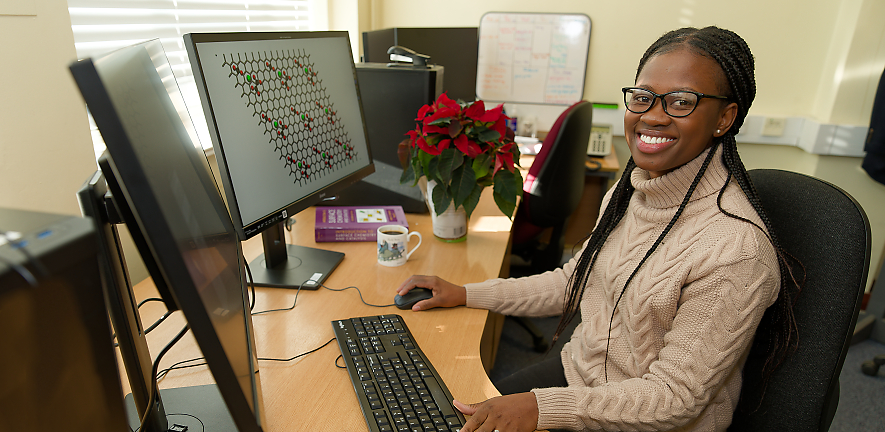
Carbon dioxide (CO2) is a harmful greenhouse gas and the major driver of climate change. As harmful as this gas is, it is also useful in fuel production and other major industrial synthesis. IniOluwa’s goal is to reduce carbon emissions from sectors which so far have not seen much improvement due to technical challenges.
IniOluwa is working to identify materials that trap CO2 on their surfaces. This gas can then be recycled into other useful chemicals or disposed of responsibly so that it does not affect the atmosphere. This process is known as carbon capture.
IniOluwa, who is a member of Professor Angelos Michaelides’ ICE group says: “If there is anything I should be doing, it is mitigating the impact of climate change. This is part of what makes my group a great place to do my PhD.”
Carbon capture with graphene

She searches for different materials that can be used for carbon capture. Graphene, a thin carbon material, is a good candidate because it is both accessible and its structure can trap gas molecules on the surface.
“Questions we need to understand are: ‘How does CO2 behave on graphene?’” says IniOluwa, “Then we can start asking ‘Can CO2 be turned into a different chemical on this surface’ and ‘how is that product useful industrially and economically?’”
However, CO2 binds too weakly on graphene for meaningful CO2 capture, so the surface must be altered to improve its strength. IniOluwa is testing graphene with different metals to figure out which coatings improve the adsorption strength.
Their first experiments have shown that certain metals improve graphene’s ability to trap gases on its surface which is promising. They have also seen oxalates forming on the surface for the first time.
This work is part of the research that IniOluwa started in Angelos’ group as a Mastercard Foundation Scholar at Churchill College. This programme provides fully-funded Master’s degrees for students from under-represented communities in Africa.
Sustainable research
IniOluwa’s work builds on ideas she developed in her earlier studies at the Ladoke Akintola University of Technology, Nigeria, where she researched wastewater treatment using activated carbon prepared from low-cost agricultural waste. Part of her research involved using coconut husks to remove ibuprofen contaminants from water safely and cheaply.
The coconut husk was first activated to open up small pores on its surface. These pores could then capture ibuprofen molecules in the waste water.
This promising research showed that the activated coconut husk is a viable and sustainable solution to clearing ibuprofen from water, and has potential for other pollutants. There are lots of applications for this research since waste products of many varieties end up in water, such as skin care, medications and pesticides.
Sustainable practices have led IniOluwa’s research journey, and the Michaelides group is the perfect environment to continue addressing these challenges.
Angelos says: “We’re very excited to have IniOluwa in our research group and looking forward to what comes from her research.”
This article first appeared in Chem@Cam magazine Winter 2023 Issue 67 pg 8.

